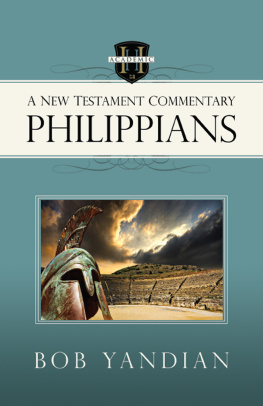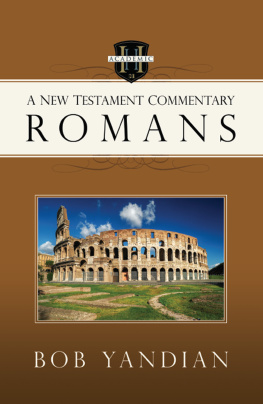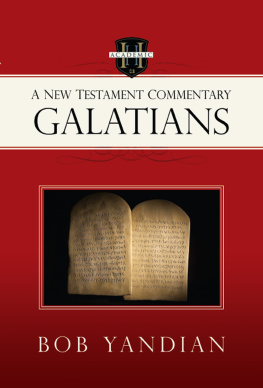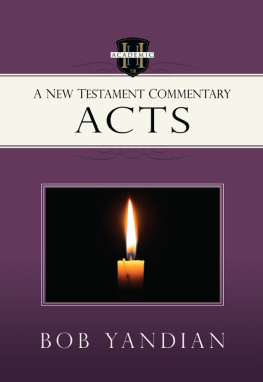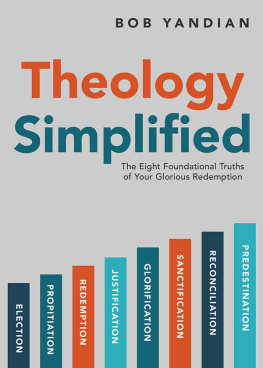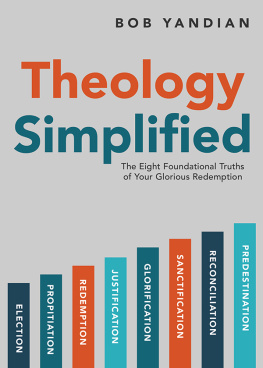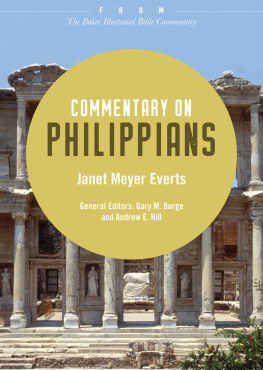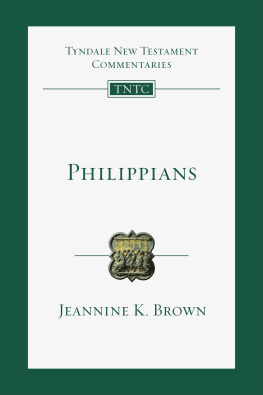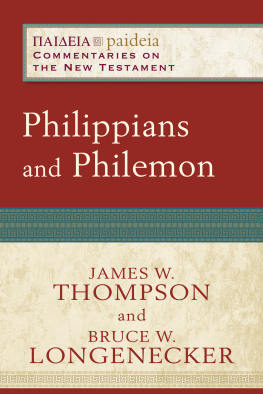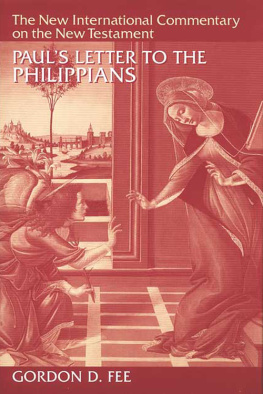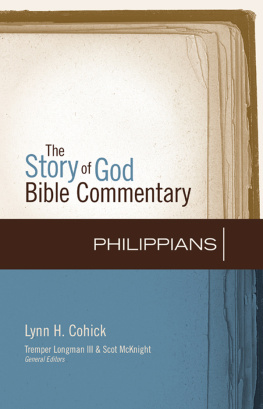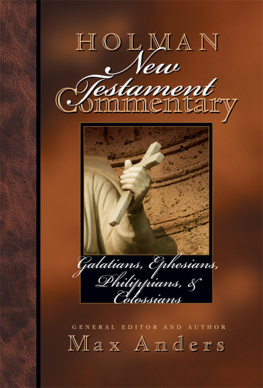Bob Yandian - Philippians: A New Testament Commentary
Here you can read online Bob Yandian - Philippians: A New Testament Commentary full text of the book (entire story) in english for free. Download pdf and epub, get meaning, cover and reviews about this ebook. genre: Religion. Description of the work, (preface) as well as reviews are available. Best literature library LitArk.com created for fans of good reading and offers a wide selection of genres:
Romance novel
Science fiction
Adventure
Detective
Science
History
Home and family
Prose
Art
Politics
Computer
Non-fiction
Religion
Business
Children
Humor
Choose a favorite category and find really read worthwhile books. Enjoy immersion in the world of imagination, feel the emotions of the characters or learn something new for yourself, make an fascinating discovery.
- Book:Philippians: A New Testament Commentary
- Author:
- Genre:
- Rating:4 / 5
- Favourites:Add to favourites
- Your mark:
- 80
- 1
- 2
- 3
- 4
- 5
Philippians: A New Testament Commentary: summary, description and annotation
We offer to read an annotation, description, summary or preface (depends on what the author of the book "Philippians: A New Testament Commentary" wrote himself). If you haven't found the necessary information about the book — write in the comments, we will try to find it.
Philippians: A New Testament Commentary — read online for free the complete book (whole text) full work
Below is the text of the book, divided by pages. System saving the place of the last page read, allows you to conveniently read the book "Philippians: A New Testament Commentary" online for free, without having to search again every time where you left off. Put a bookmark, and you can go to the page where you finished reading at any time.
Font size:
Interval:
Bookmark:

Convenient.

For the latest Harrison House product information and author news, look no further than your computer. All the details on our powerful, life-changing products are just a click away. New releases, email subscriptions, testimonies, monthly specials find them all in one place. Visit harrisonhouse.com today!
PHILIPPIANS
A New Testament Commentary
Bob Yandian

All bolded scripture quotations are from the New King James Version of the Bible. Copyright 1982 by Thomas Nelson. Used by permission. All rights reserved.
All other scripture quotations, unless otherwise noted ,are adapted from the King James Version of the Bible.
PHILIPPIANS: A New Testament Commentary
ISBN: 978-1-68031-188-4
2016 by Bob Yandian
Bob Yandian Ministries
PO Box 55236
Tulsa, OK 74155
www.bobyandian.com
Published by Harrison House Publishers
Tulsa, OK 74155
www.harrisonhouse.com
All rights reserved under International Copyright Law. Contents and/or cover may not be reproduced in whole or in part in any form without the express written consent of the publisher.
Printed in the United States of America.

My heart echoes a statement Peter made in his last epistle:
For this reason I will not be negligent to remind you always of these things, though you know and are established in the present truth.
2 Peter 1:12
The for this reason was to build on his previous statement Peters desire for all believers not just to get to heaven, but to have an abundant entrance into heaven. A working knowledge and practice of the Word of God is necessary for an abundant entrance, which is marked by rewards and rulership.
In order to establish that abundant entrance, Peter taught believers what they should know again and again, though you know them. What was taught them was the present truth. The present truth is what was being written in the day of the apostles Peter, Paul, John, and James.
This present truth is what believers still need to be gloriously saved. The Old Testament is to be studied in the light of the New Testament epistles. The four gospels are to be studied in the light of the New Testament epistles. Not only should every Christian know the epistles, they should be established in them.
This is why I have written this series of books, verse-by-verse teachings on the epistles of Paul, Peter, John, and James. This is truly meat for our time period, our dispensation: the Church Age.
Bob Yandian
Author
Writer: The Apostle Paul.
Time: About 6166 AD.
Occasion: Paul was under house arrest in Rome. He was writing to the town where he and Silas were imprisoned for the first time (Acts 16). Paul is expressing his thanks and appreciation to the group of people who stood by him with their prayers and financial support. This church had done more than any other.
While Paul was under house arrest, he was always chained to a guard. Many of his guards accepted the Lord, and Paul will tell of their greetings from Neros house (Philippians 4:22).
Theme: Joy ( chara ) in the midst of every situation. Paul suffered imprisonment, yet he had joy. This joy is above and beyond what the world can have or understand (4:7).
Background on Philippi
Situated on the level plain where the battle took place between the com bined forces of Antony and Brutus and those of Cassius and Octavius. In honor of the battle, the Romans made it a colony and a border garrison an outpost for Caesar. Because of the citys great beauty, it became a retirement center for Roman military personnel. The Philippian people were very disciplined and understood authority. There was no synagogue in Philippi because there were no Jews there that we know of.
Historical Background (Acts 15:3616:12)
I n verse 36 of Acts 15, Paul asked Barnabas to return to Galatia and visit the churches in that region. There had just been a counsel in Jerusalem to discuss various areas of legalism toward Gentile churches. The church at Jerusalem was still considered to be the governing church (Galatians 2:110). The doubtful things of Corinth (liberties enjoyed by Gentiles) were discussed. Compromises in convictions were made so believers could work together. These were also agreed on between Jews and Gentiles as proper submission to authority (15:21). Paul needed to return to the churches he had established and give them direction. Barnabas again wanted to take Mark (15:3738), who had deserted them in Pamphylia on the first missionary journey (13:13). Paul calls him a deserter and lazy because he would not work.
Barnabas and Paul got into an argument (15:3941). It was difficult for Barnabas to become angry enough to confront Paul. He is called the son of consolation (exhortation and encouragement) (4:36). He was among those who gave in to the legalistic Jews in Galatians 2:13... insomuch that Barnabas also was carried away.
Barnabas was right concerning the issue, but wrong in getting angry. Barnabas erred against authority and Paul erred against grace. Barnabas should have submitted to Paul, and Paul should have submitted to the grace of God. This was the attack of Satan to destroy the work in Galatia, but it did not work. Paul went one way with Silas, while Barnabas went another way with Mark, and God blessed them all.
In Acts, chapter 16, verses 1 and 2, Paul and Silas found Timothy in Galatia. He was a disciple raised by a believing mother and grandmother (2 Timothy 1:5). His unbelieving father had deserted him at a young age. Timothy had a good reputation with the saints in Galatia, and Paul wanted him on his team.
In verse 3, Paul had Timothy circumcised. He would be working around Jews, and it was important to have him circumcised. Titus was not circumcised (Galatians 2:3) because his ministry was around Gentiles, and it would be a matter of legalism to do so.
There is a time when something is right and a time when it is wrong. These issues are not spelled out in the Word of God, and a person has to know how to discern between good and evil (Hebrews 5:14). Wrong decisions concerning such things can result in barriers which hinder witnessing and missionary work.
In verse 4, Paul took the decrees from the Jerusalem church to these Gentile churches and established them in submission to the authority of the apostles and elders. Acts 16:5 shows this stabilized the churches in Galatia.
Paul would never come into a city and demand change of the Gentiles before preaching the gospel to them. He became all things to all men. However, after they accepted salvation, changes were imposed, and the believers submitted for peace and the furtherance of the gospel.
In verses 6 through 8, the Holy Spirit forbade Paul to go to Bithynia and Asia but Paul kept on moving until he came to Troas, a city on the Aegean Sea.
God gave Paul a vision to go to Macedonia, so he and his team launched out (vv. 910). The winds were perfect to send them straight there. Notice the order of events: Paul was always on the go for the Lord, and he received a vision. Then circumstances lined up. Circumstances will line up after a call, but we do not necessarily have a call just because circumstances line up.
Font size:
Interval:
Bookmark:
Similar books «Philippians: A New Testament Commentary»
Look at similar books to Philippians: A New Testament Commentary. We have selected literature similar in name and meaning in the hope of providing readers with more options to find new, interesting, not yet read works.
Discussion, reviews of the book Philippians: A New Testament Commentary and just readers' own opinions. Leave your comments, write what you think about the work, its meaning or the main characters. Specify what exactly you liked and what you didn't like, and why you think so.

